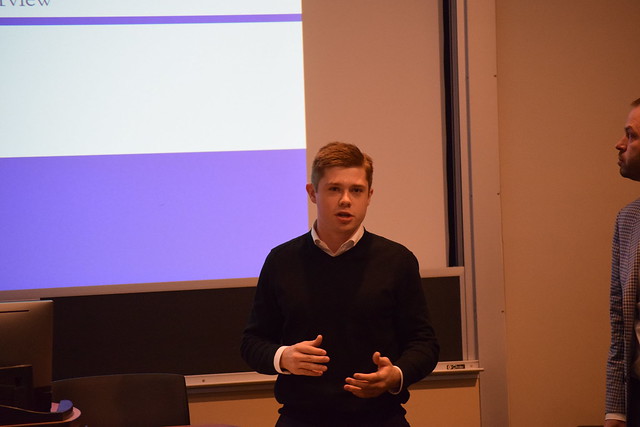In December 2017, a team of 15 Notre Dame students was assembled to help prepare DARI Motion, a subsidiary of Scientific Analytics, for its institutional capital raise as one of the inaugural projects of the Notre Dame Institute for Global Investing’s Corby Capital Investment Projects. The team, compiled of students from a diverse set of majors and grade range, was led by seniors Jaclyn Daily, Will Lederer, Tom Palmerton, Parker Mathes, and Jon Carr. Partnering with executive leaders from DARI Motion and industry advisors, the team of students conducted a comprehensive analysis of the company to determine its current status and future capabilities and drafted a Confidential Information Memorandum (CIM). The CIM will be used to attract institutional investors during their fundraising rounds.
Each senior functioned as the point person for one aspect of the project, from overseeing the team’s Executive Summary to managing the financial and technological aspects of the project. Senior Jaclyn Daily also emphasized the value of incorporating students from various academic backgrounds in the initiative: “The rationale behind that was in order to provide a holistic view of the company, it would be best to have people that not only understood the technology from a science standpoint but also people that understood the financial progress of the company,” she said. When presenting the analysis to DARI Motion, it proved advantageous to have the diversity of thought.
DARI is a markerless, motion capture technology that analyzes the body in order to determine the quality and health of an individual’s movement. Without the limitations of physical markers on the human body and the potential for error associated with their placement, DARI strives to assess motion health in a more consistent and expedient manner. DARI is currently used in healthcare, athletic performance, corporate wellness, and the military sectors.
With key advisement from both the Notre Dame faculty and industry professionals, the students learned first-hand about the DARI Motion technology, and some even participated in their own DARI physical evaluation. Notre Dame Athletics took a particular interest in this technology due to its ability to assist student athletes. Athletes can stand in front of DARI’s motion capture sensors and perform a series of movements to determine flexibility, range of motion, balance and various other strengths and weaknesses. This comprehensive report can then inform trainers in designing exercises specific to each athlete, ensuring improvement of their weak points and retainment of their strong points. Athletes are then re-tested at a later date to quantify their improvements.
Throughout the entire project, students engaged in the practical application of essential career development skills such as interpersonal interaction, presentation and in-depth analysis.
Due to the multifaceted nature of the project, they were also able to gain an array of experiences relevant to potential postgraduate career paths. For example, they had the ability to work directly with practicing industry professionals from established companies, employees of Scientific Analytics Inc., the parent company of DARI since 2017, and with various Notre Dame alumni currently working in the investment industry. Underclassmen received the added benefit of ongoing feedback from their senior team leaders which allowed for a unique environment of peer-to-peer constructive criticism.
NDIGI Managing Director Kevin Burke explained that he believes projects like the DARI memorandum are pivotal in developing students’ complete learning experience. The opportunity prepares students for work after graduation by helping to bridge the gap between academic theory and practical application of knowledge. Senior Will Lederer echoed this sentiment, noting, “The fact that we were able to work with a real company doing this and receive live feedback on our work and kind of how we were viewing the company versus how they were viewing the company, really was a truly strong learning experience that will be something I will absolutely use next week, next year, for the rest of my career.”
